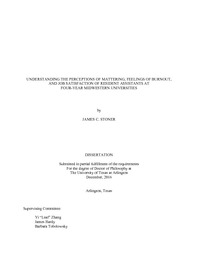
ATTENTION: The works hosted here are being migrated to a new repository that will consolidate resources, improve discoverability, and better show UTA's research impact on the global community. We will update authors as the migration progresses. Please see MavMatrix for more information.
Show simple item record
| dc.contributor.advisor | Zhang, Yi Leaf | |
| dc.creator | Stoner, James C | |
| dc.date.accessioned | 2017-02-14T15:30:19Z | |
| dc.date.available | 2017-02-14T15:30:19Z | |
| dc.date.created | 2016-12 | |
| dc.date.issued | 2016-11-30 | |
| dc.date.submitted | December 2016 | |
| dc.identifier.uri | http://hdl.handle.net/10106/26364 | |
| dc.description.abstract | Since first conceptualized in the 1970s, employee burnout has received much scholarly attention in various service-oriented fields. While some disciplines have benefited from an abundance of burnout research (e.g., nursing, education), other specific jobs have received limited attention. One such position is the Resident Assistant (RA) job on college campuses. RAs serve a critical, service-oriented role in higher education and have a wide range of difficult job responsibilities. As such, RAs are not immune to burnout.
The limited existing research on RA burnout has failed to address the foundational cause of burnout; that is, the relationships between RAs who provide care and the residents to whom RAs are responsible for providing care. Therefore, this study addressed this “relationship gap” by using the theoretical framework of mattering to explore the relationships between RAs and their residents. On the most fundamental level, mattering asks if others are aware of us, find us important, and rely on us.
This study surveyed RAs at four four-year Midwestern institutions. The collected data were analyzed using quantitative procedures to assess differences in RA mattering and burnout between gender, community composition, and employment choice; to determine the relationships between RA mattering, burnout, and job satisfaction; to develop models of RA mattering predicting RA burnout; and, to develop models predicting RA job satisfaction through RA background characteristics, mattering, and burnout.
The results of this study reveal that RAs who chose not to return to their position the following year perceive lower levels of mattering to their residents and increased feelings of burnout. Additionally, mattering was found to significantly predict two of the three burnout dimensions: depersonalization and personal accomplishment. Combined with the three dimensions of burnout, select components of mattering significantly predicted a substantial amount of the variance in RA job satisfaction. Recommendations for research and practice are shared. | |
| dc.format.mimetype | application/pdf | |
| dc.language.iso | en_US | |
| dc.subject | Resident assistant | |
| dc.subject | Burnout | |
| dc.subject | Mattering | |
| dc.subject | Job satisfaction | |
| dc.subject | University housing | |
| dc.title | Understanding the Perceptions of Mattering, Feelings of Burnout, and Job Satisfaction of Resident Assistants at Four-Year Midwestern Universities | |
| dc.type | Thesis | |
| dc.degree.department | Educational Leadership and Policy Studies | |
| dc.degree.name | Doctor of Philosophy in Educational Leadership and Policy Studies | |
| dc.date.updated | 2017-02-14T15:32:26Z | |
| thesis.degree.department | Educational Leadership and Policy Studies | |
| thesis.degree.grantor | The University of Texas at Arlington | |
| thesis.degree.level | Doctoral | |
| thesis.degree.name | Doctor of Philosophy in Educational Leadership and Policy Studies | |
| dc.type.material | text | |
| dc.creator.orcid | 0000-0001-9319-8666 | |
Files in this item
- Name:
- STONER-DISSERTATION-2016.pdf
- Size:
- 1.335Mb
- Format:
- PDF
This item appears in the following Collection(s)
Show simple item record


